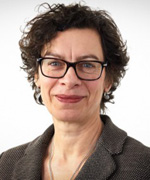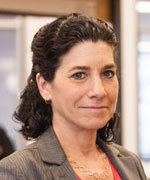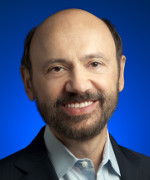Jeanette Hofmann
TitleDilemmas of digitization
DateWednesday, May 20, 2015
Time9.15-10.05
RoomPlenary Room
Jeanette Hofmann is a political scientist with a focus on Internet governance. She heads a research group on internet policy at the Berlin Social Science Center, she is co-director of the Humboldt Institute for Internet and Society and professor for Internet policy at the Berlin University of the Arts. Current research interests include multi-stakeholder processes and the role of technical, legal and social norms in Internet regulation. In addition to her academic work, Jeanette has been involved in various transnational processes such as the UN World Summit on the Information Society, the Internet Governance Forum, as a co-chair in the NetMundial conference, and, as an expert member, in the committee of inquiry of the German Parliament “Internet and Digital Society”.
Dilemmas of Digitization
The spread of the Internet and its services are creating a growing number of new dilemmas that are specific to the digital age. Many, but by no means all of these revolve around the production and use of personal data. A recent example concerns the conflict between freedom of information and the “right to be forgotten”. The solutions to these dilemmas are likely to become the basic principles or institutions that will shape the future of digital societies.
Deborah Estrin
TitleWhat could we do with access to our small data?
DateThursday, May 21, 2015
Time9.00-10.00
RoomPlenary Room
Deborah Estrin (PhD, MIT (1985); BS, UCB (1980)) is a Professor of Computer Science at Cornell Tech in New York City where she has founded the Jacobs Institute’s HealthTech Hub. Her small data lab focuses on mobile health and small data, leveraging the pervasiveness of mobile devices and digital interactions for health and life management (TEDMED). Estrin co-founded the non-profit startup, Open mHealth, and was the founding director of the NSF-funded Science and Technology Center for Embedded Networked Sensing (CENS) at UCLA (2002-12). Her awards include: ACM Athena Lecturer (2006) and Anita Borg Institute’s Women of Vision Award for Innovation (2007), and elected membership to the American Academy of Arts and Sciences (2007) and National Academy of Engineering (2009).
What could we do with access to our small data?
The digital traces we generate daily paint a ‘picture’ of our life over time. These diverse data can be analyzed to draw powerful inferences—not just about an individual, but also for that individual. Use of applications that are fueled by these traces could positively transform our experiences as patients, students, family members, and consumers. To realize these benefits individuals need programmatic-access to their data, as well as the ability to securely and selectively manage their use by third party apps and services. This talk will discuss precedents for small data in mobile health, and the opportunities and challenges of broadening the scope of small data access and use.
Andrei Broder
TitleHow good was our crystal ball? A personal perspective and retrospective on favorite Web research topics
DateFriday, May 22, 2015
Time9.00-10.00
RoomPlenary Room
Andrei Broder is a Google Distinguished Scientist. From 2005 to 2012 he was a Fellow and VP for Computational Advertising at Yahoo!. Previous positions include Distinguished Engineer at IBM and VP for Research and Chief Scientist at AltaVista. He was graduated Summa cum Laude from Technion and obtained his M.Sc. and Ph.D. in Computer Science at Stanford under Don Knuth. Broder has authored more than a hundred papers and was awarded forty nine US patents. His current research interests are centered on user understanding, computational advertising, context-driven information supply, and randomized algorithms. He is a member of the US National Academy of Engineering and a Fellow of ACM and of IEEE. Other honors include the ACM Paris Kanellakis Theory and Practice Award and a Honoris Causa doctorate from Technion. Broder is a co-winner of the Best Paper award at WWW’97 (for his work on near-duplicate page detection) and at WWW’00 (for his work on mapping the web). Florence will be his 19′th WWW conference.
How good was our crystal ball? A personal perspective and retrospective on favorite Web research topics
It is customary for WWW invited talks to indulge in soothsaying: I will not break with tradition, but as a sobering exercise, will start by reviewing some Web research and predictions I co-authored over the last two decades: both what turned out gratifyingly right and what turned out embarrassingly wrong. Topics will include near-duplicates, the Web graph, relevance signals, query intent, the shape of consumer demand, information retrieval vs. information supply, and others. While this seems a completely idiosyncratic collection there are in fact concealed connections that offer good clues to the big question: what will happen next?




